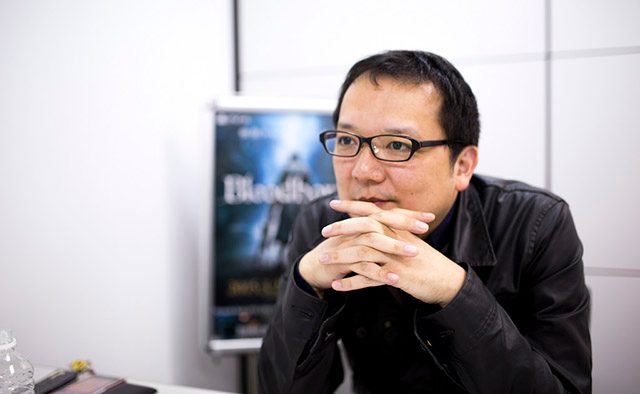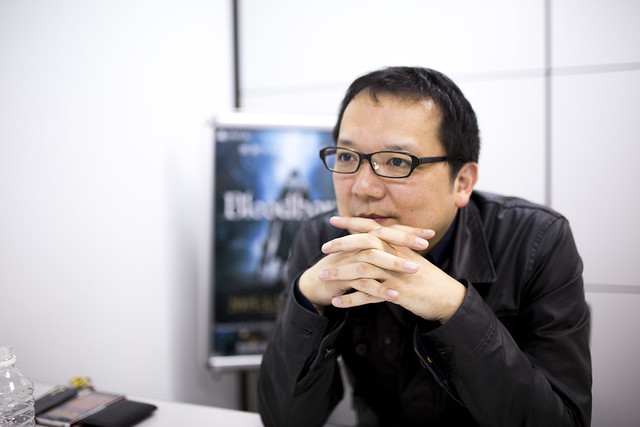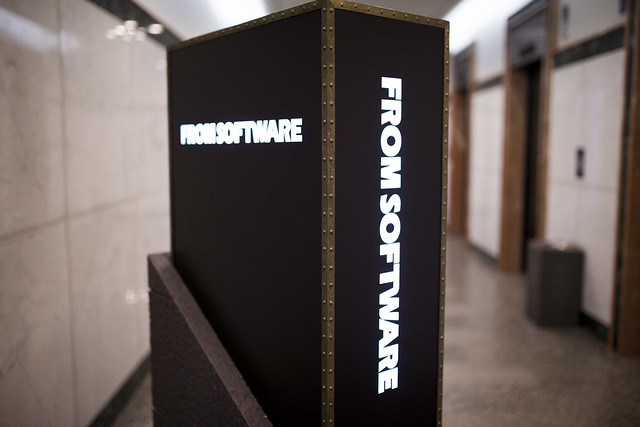
Okay, let’s make this 100% clear. When it comes to the Souls series – and the work of creator Hidetaka Miyazaki in general – I’m a proud, unabashed fanboy and I’ll happily assault anyone who comes within shouting distance with irrefutable testament. Duly, with From Software’s latest effort – the deliciously dark action epic Bloodborne – just a few days out from launch, I’ve got one last chance to jump on my sandbox and bang the drum ;)
Last week, Miyazaki-san was kind enough to put aside a little of his valuable time to answer a few questions about his eagerly anticipated PS4 exclusive. Read on to find out what he had to say – and you need not worry about spoilers. Like so many of you, I’m doing my upmost to ensure I know as little as possible about the gruesome treats that lie in wait when I boot up my copy of the game next week.
The Souls titles were never specifically labelled ‘horror’, but I can think of few other games that fill me with such a sense of fear and dread while playing. It looks like you’re taking that ball and running with it in Bloodborne – just watching the trailers makes me incredibly anxious…
Hidetaka Miyazaki: There are several reasons why you need a sense of horror in the world, especially with Bloodborne, which has a more chilling world view than Souls. It’s not like horror is something we specifically go for, but it’s important to have that sense of fear and terror because it directly ties into the player overcoming that and enhancing their sense of achievement.
At the same time, my personal view is that the world we live in can be a harsh and unkind place. To create a game world that is always kind to players – that’s not how I see the real world. Whether it be nature or society, it’s often a harsh and unkind environment – so that translates into my games.
I know there are some who prefer the ‘hub’ system from Demon’s Souls but for me, one of the most memorable aspects of your recent work was the extraordinary world-building of Dark Souls – how the game’s locations all linked up like some grand, intricate work of origami. How have you approached Bloodborne’s map design?
Hidetaka Miyazaki: I wanted to take the best of both approaches. So every area is linked in one way or another much like the first Dark Souls, but you also have a hub system like Demon’s Souls.
The world itself is a painted world in several respects – like Dark Souls – but essentially each area is still seamlessly connected. At the same time, to access each point, there are central hubs that act as warp points, and to reach new points, you still have the hub which also acts as a refuge as well. I wanted to combine the best of these elements so that you’d be able to easily go to areas you’ve already discovered.
Since launch, the stature of Demon’s Souls and Dark Souls has grown and grown, and they now inhabit pretty rarefied air, comfortably sitting among the all-time greats. How do you deal with having such an obsessive and passionate fanbase?
Hidetaka Miyazaki: First of all, I’m incredibly happy to have these fans. I’d be lying if I didn’t feel pressure to meet their expectations, but I get a lot of enjoyment reading and hearing what they have to say.
For these people to put so much time into my games and really discuss things that I’ve created with such passion… I’ll go online and enjoy reading what they have to say. Of course, sometimes there are things that are not so enjoyable to read – but even taking that on board, over all I take great pleasure in their comments. As a creator it’s such a valuable resource, to listen to their honest feedback and think about what game I’m going to make next. You couldn’t go out there and pay people money to put in the hours that these people do!
When I went to PlayStation Experience in the USA at the end of last year, there was a Q&A panel there with the players, and I realised the level of passion that people have.
Does it bother you that people are so fixated on your games’ perceived high level of difficulty, rather than other aspects of the experience?
Hidetaka Miyazaki: It’s not something I find frustrating. I do understand why people ask about it a lot, but I’m happy that people are fascinated by it – in that respect I don’t mind being repeatedly asked about difficulty. It’s something that I find enjoyable to discuss.
As a game creator – or a creator of anything – for people to be fascinated and ask questions and be curious about what I’m making, that’s something that can’t be taken for granted and I’m very grateful for that.
Often to the detriment of my social life, I’ve found Souls games to be hugely replayable, relinquishing new secrets every time I return to them. How are you approaching New Game + in Bloodborne?
Hidetaka Miyazaki: The actual set-up is essentially the same, but if you play it I think you’ll see that the feel is a bit different to Souls. There is that replayability in the same form for Bloodborne as there was in Dark Souls, but it’s a different game, so even if the feature is similar, you might have a different experience with New Game + or New Game ++ – or however many times you choose to replay.
A simple example is that there is no defensive style of play in Bloodborne. That starts to be more apparent the more New Game + playthroughs you go through. So a gamer can experience a different taste of New Game + compared to a Souls game. I’d like gamers to challenge themselves and see what they can get out of New Game +.
There’s been a little consternation among Souls fans on the web at the suggestion that Bloodborne won’t feature quite so many weapons as in the Souls games. Can you clarify exactly how the weapon system works in Bloodborne?
Hidetaka Miyazaki: In terms of how many physical weapons there are, the amount is less than in a Souls game, but that’s to some extent a decision made due to the game design.
The weapons transform – so one weapon will have various uses and strategies that you can implement. You can also customise your weapon with Blood Gems. There are different types and you can slot in up to three at a time. One gem might have you use less stamina per swing, for example.
You can have many different combinations – so actually the amount of weapons in Souls is absorbed in Bloodborne by this customisation element and how someone can tailor a weapon to how they want to use it. In a way, the variety is still there, but it’s absorbed down on a customisation level, rather than in the quantity of actual weapons, much more than in Souls.













Comments are closed.
24 Comments
Loading More Comments